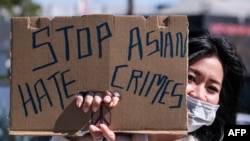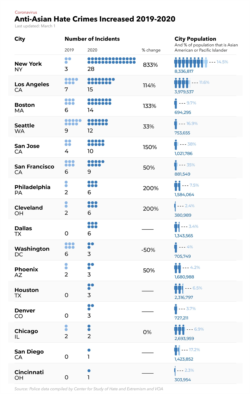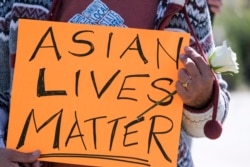Hate-fueled attacks on Asian Americans spiked across major U.S. cities last year — in some cases by triple-digit percentages — even as overall hate crimes declined, newly analyzed police department statistics show.
Moreover, the alarming trend has continued into this year, experts say.
There were 122 incidents of anti-Asian American hate crimes in 16 of the country’s most populous cities in 2020, an increase of almost 150% over the previous year, according to data compiled by California State University’s Center for the Study of Hate and Extremism and exclusively shared with VOA. VOA independently collected data for two of the cities.
Asian American rights advocates attribute the unprecedented string of attacks to former U.S. President Donald Trump’s rhetoric blaming China for the deadly coronavirus and, more broadly, the scapegoating of Asian Americans by ordinary people frustrated or angered by the economic and social impact of the pandemic.
“I think the political leadership under Trump really put a target on the backs of people perceived to be Chinese. It's Sinophobia,” said Chris Kwok, a board member for the Asian American Bar Association of New York.
The increase in anti-Asian hate crime was the highest in New York City, the country’s largest city with a sizeable Asian population, where police investigated a record 28 incidents involving Asian American victims, a more than ninefold increase over 2019.
Four other American cities also reported triple-digit percentage increases in anti-Asian hate crimes: Philadelphia and Cleveland each reported six incidents, up from two in 2019; San Jose had 10, up from 4, while Los Angeles reported 15, up from seven.
“While most cities experienced overall hate crime declines, including attacks against groups that had recently spiked like Jews, attacks against Asians rose materially in most cities, and only declined in one — Washington, D.C.,” said Brian Levin, executive director of the hate and extremism research center.
The FBI defines a hate crime as a criminal offense motivated by race, religion, sexual orientation and other factors. Examples include assault and vandalism. Each November, the FBI publishes its annual hate crime data for the previous year. That means the data released by a handful of police agencies provides the only early window into the number of hate crimes last year.
Though based on a relatively small sampling of data, the figures “strongly suggest that 2020 will be the worst year this century for anti-Asian hate crime,” Levin said.
The reported spike in anti-Asian hate crimes is in line with data tracked by Asian American advocacy organizations.
Stop AAPI Hate, a hate tracker created last year by several Asian American groups, has recorded more than 2,800 incidents of racism and discrimination targeting Asian Americans between March and December 2020. While verbal harassment and shunning made up more than 90% of the incidents, physical assaults accounted for nearly 9%.
Many of the victims are non-Chinese Asians who apparently were mistaken for having hailed from China.
“East Asians who look Chinese are now experiencing this, and this goes back to a long history of anti-Asian discrimination in this country,” Kwok said of the United States.
In a troubling report released last month, Stop AAPI Hate said 126 of the incidents involved Asian Americans over the age of 60. A number of incidents took place in the San Francisco Bay area last month, including one involving a 91-year-old Asian man violently pushed to the ground by a stranger.
“These violent assaults have a devastating impact on our community as they are part of an alarming rise in anti-Asian American hate during the COVID-19 pandemic,” co-founders of STOP AAPI Hate said in a February 9 statement.
In the latest incident, Salman Muflihi, 23, was arrested last week for allegedly stabbing a 36-year-old Asian man on a street in New York City’s Chinatown. Muflihi was charged over the weekend with one count of attempted murder in addition to other charges, but not a hate crime. If authorities were to file a hate crime, it could result in a longer prison sentence.
Kwok said “there is a level of frustration” in the Asian American community over prosecutors’ refusals to file hate crime charges.
“I think they need to really reassess how they approach it, particularly in this era that we're in, which I think of it as an emergency area, particularly for Asian Americans as they experience discrimination,” he said.
In a statement, the Manhattan District Attorney’s office said additional charges may be forthcoming.
Meanwhile, overall hate crimes last year declined by an average of 7% in the 15 cities tracked by the center for the study of hate and extremism. In New York City, for example, police investigated 265 hate crimes, down from 428 the previous year.
Of the five cities that reported increases, two are in California, including San Jose, which saw an increase of 162%.






